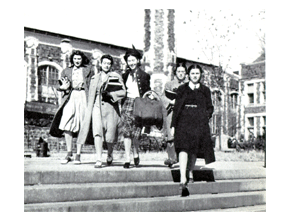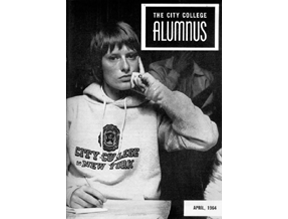
| COHEN LIBRARY PRESENTS |
| Women at City College: A Fifty Year Anniversary Exhibit |
|||||
| online exhibitions | about exhibit | enter exhibit | |||
 |
| CCNY tech women 1942 Microcosm enlarge image |

|
| Alumnus April1964 enlarge image |
 |
| In the Chemistry Lab enlarge image |
| September
1951 marked the point in the City College’s history when
women finally breached the last formal barriers to full enrollment at
the College. Women were for the first time allowed to enroll in the College
of Liberal Arts and Science, the last unit of the College to remain male
only.
Prior to September 1951 the role of women at City College was defined, in part, in contrast to the privileged and protected arenas in which men taught, studied and did research. The earliest records of women at the College were as cleaning women in the first decade of the 1900s. The 1910s women were hired as librarians in professional “quasi-academic” non-tenure-bearing positions. With Hunter College having been established in 1869 to offer collegiate training to young women, women did not matriculate in any division of The City College until their admission into the School of Education in 1917. From 1917 until 1930 women were allowed to matriculate only within the School of Education. In 1930 women were allowed to matriculate in both the day and evening sessions of the School of Business, later to become Baruch College. Even here, courses at the City College were only allowed to admit women only if equivalent courses were not available at Hunter College. In the late 1930s women breached the barrier that was keeping them out of the School of Technology. In 1938 Gladys Lovinger was accepted for enrollment in the School of Technology. Ms. Lovinger did not complete her degree, due it seems to a professor who did not particularly care for women in his classes and who assigned her a grade low enough to keep her out of the program. Also during the 1930s women had begun to be hired into the lower ranks of the faculty, especially in art and in music, and in the “Downtown” business school, but not the male dominated “Uptown” Center. In 1945 Ms. Cecile Froelich was hired into the Faculty in the Department of Electrical Engineering. From 1945 until her retirement in 1966 Prof. Froehlich blazed the way in being the first woman to be elected chair of any department at City College. By the time of her retirement in 1966 Prof. Froehlich had risen to the rank of full Professor. In the late 1940s women organized to advocate for the right of women to be admitted to the College of Liberals Arts and Science, and in May of 1950, Ms. Elaine Shapiro, representing the Organization for Women’s Rights at City College, appealed to the Board of Higher Education that women be allowed to matriculate in CLAS. A year later, as a result largely of a fear that the military draft for the Korean War would deplete City College of its male students and bring on a financial crisis, women were admitted to CLAS subject to certain limitations in numbers. Women would only be allowed to matriculate in numbers equal to the number of men admitted to Hunter College in the Bronx (later Lehman College). However, since no coordination occurred between the two colleges, women were admitted to City College subject only the same qualifications as men, that is, by virtue of their academic performance. This exhibition commemorates the history of the struggle for full participation of women at City College, highlights contributions that City College women have made to the College, and celebrates the excellence of City women ’s achievements. |
| Copyright © The City College Library |